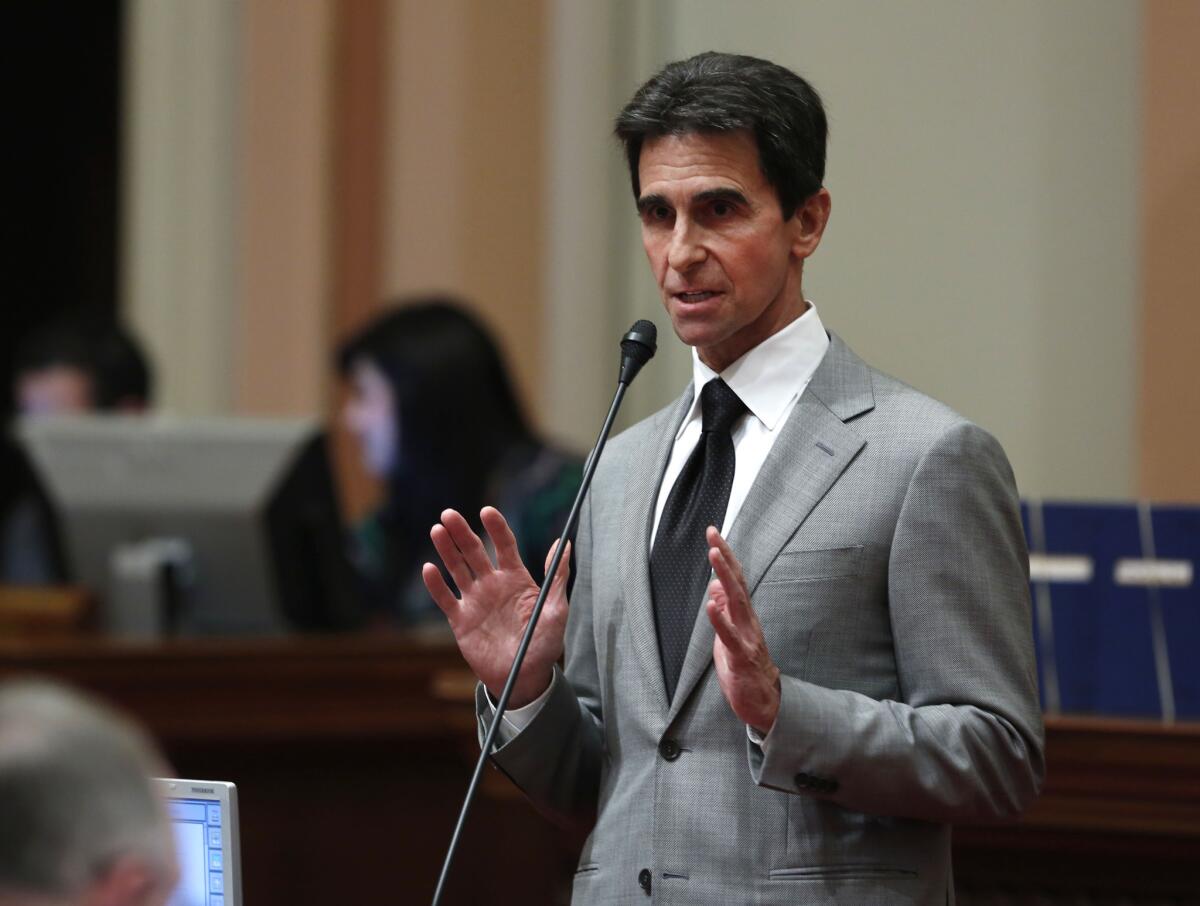State Senate backs $13 minimum wage, disclosure of who provides free trips

State Sen. Mark Leno (D-San Francisco), pictured during a recent floor debate, has proposed raising the state minimum wage to $13 per hour by 2017.
- Share via
Reporting from Sacramento — The state Senate on Monday passed a bill that would raise California’s $9 minimum wage to $11 an hour on Jan. 1 and boost it again to $13 in 2017.
Sen. Mark Leno (D-San Francisco) made the proposal out of concern that census figures show a quarter of the state’s 38 million residents live in poverty, he said.
“It is time that we make it illegal to pay sub-poverty wages in California,” Leno told his colleagues during a heated floor debate.
He said the wage increase would boost the economy because working families would be able to spend more money. “It’s going to be spent immediately to meet daily needs in our community,” he said.
The bill passed 23 to 15, on a largely party-line vote.
Sen. Jeff Stone (R-Murrieta) opposed the measure, predicting it would force businesses to cut workers. The proposal “hurts the economy by causing job losses,” he said.
Sen. Tom Berryhill (R-Modesto) said minimum wage was never meant to be a wage for families to live on. “It is a start-up wage for kids,” he said.
Sen. Connie Lleyva (D-Chino) countered, “There are people trying to support their families living on minimum wage, and it simply doesn’t work.”
An employee working full time and earning $9 per hour takes home about $18,000 annually before taxes, Leno noted — 75% of the federal poverty level for a family of four.
Two years ago, lawmakers and the governor increased the minimum wage to $10, to begin Jan. 1 of next year. Leno’s bill would impose specific raises until 2019 and adjust for inflation thereafter.
Some California cities have raised minimum wages on their own. In Los Angeles, the City Council is set to vote this week on raising the minimum wage to $10.50 on July 1, 2016, and then increasing it gradually to $15 in 2020. San Francisco is phasing in an increase that tops out at $15 in 2018.
Leno’s bill, SB 3, now goes to the Assembly.
Also Monday, faced with criticism over free trips to Hawaii and other locales by state lawmakers, the Senate approved a measure that would force disclosure of who picks up the tabs.
The proposal, by Sen. Jerry Hill (D-San Mateo), would require nonprofit groups that provide gifts of travel to elected state and local officials to disclose the names of the original donors financing the trips. The bill, approved 36 to 1, also would require lawmakers to annually report their destinations.
“Currently, nonprofits do not have to disclose the source of travel funding, preventing the public from knowing who is behind the gift to the elected official,” Hill told his colleagues.
State officials accept hundreds of thousands of dollars in travel expenses as gifts each year. Last year, those included trips to Spain, Portugal, China, Israel, Peru, Chile, El Salvador, Mexico and Canada.
One of the most popular destinations is an annual conference held in Maui by the nonprofit Independent Voter Project, which receives its money from interests including utilities, unions and industry groups, which typically have business before the Legislature.
The legislation, SB 21, next goes to the Assembly.
Also on Monday:
• The Senate passed a measure by Sen. Holly Mitchell (D-Los Angeles that would repeal a rule against welfare benefits for children conceived while their mothers were already receiving aid. The vote on SB 23 was 25 to 6; some Republicans sided with Democrats in favor of the change.
• The Assembly approved a bill to designate high school cheerleading a sport. The bill, AB 949 by Assemblywoman Lorena Gonzalez (D-San Diego), would require the California Interscholastic Federation to develop guidelines and safety standards for competition cheer. It passed 71 to 3.
• The Assembly passed a measure that would enable judges, in a criminal proceeding, to tell the jury whether the court had determined that the prosecutor intentionally failed to disclose evidence. AB 1328 by Assemblywoman Shirley Weber (D-San Diego) passed 41 to 34.
Twitter: @mcgreevy99, @melmason
More to Read
Sign up for Essential California
The most important California stories and recommendations in your inbox every morning.
You may occasionally receive promotional content from the Los Angeles Times.














